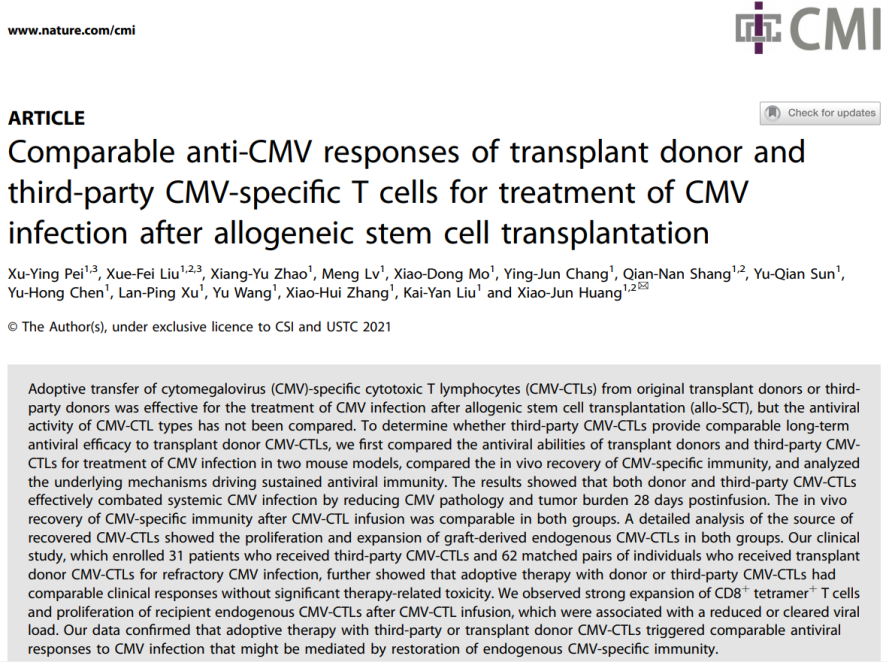Hematology | Prof. Huang Xiaojun’s Research Team Publishes New Research Results in Cellular & Molecular Immunology
2022-04-19
On January 11th, 2022, Prof. Huang Xiaojun’s team from the Department of Hematology at Peking University People’s Hospital and Peking University Institute of Hematology published an article entitled “Comparable anti-CMV responses of transplant donor and third-party CMV-specific T cells for treatment of CMV infection after allogeneic stem cell transplantation” in Cellular & Molecular Immunology (IF=11.530), a high-quality Nature Portfolio journal. The research was presented as a poster at the 2021 American Society of Hematology Annual Meeting (ASH), and presented as an oral presentation at the 2021 National Congress on Experimental Hematology.

Cytomegalovirus (CMV) infection is a major and potentially life-threatening complication following allogeneic stem cell transplantation (allo-SCT). Patients undergoing allo-SCT have a high incidence of CMV infection with subsequent poor prognosis, which seriously affects the efficacy of transplantation. Previous studies reported that adoptive transfer of cytomegalovirus (CMV)-specific cytotoxic T lymphocytes (CMV-CTLs) from original transplant donorsthird party donors was effective for the treatment of CMV infection after allogenic stem cell transplantation (allo-SCT), but the antiviral activity of CMV-CTL types has not been compared.
To determine whether third-party CMV-CTLs provide comparable long-term antiviral efficacy to transplant donor CMV-CTLs, the researchers first compared the antiviral abilities of transplant donors and third-party CMVCTLs for treatment of CMV infection in two mouse models, compared the in vivo recovery of CMV-specific immunity, and analyzed the underlying mechanisms driving sustained antiviral immunity. The results showed that both donor and third-party CMV-CTLs effectively combated systemic CMV infection by reducing CMV pathology and tumor burden 28 days postinfusion. The in vivo recovery of CMV-specific immunity after CMV-CTL infusion was comparable in both groups. A detailed analysis of the source of recovered CMV-CTLs showed the proliferation and expansion of graft-derived endogenous CMV-CTLs in both groups. This clinical study, which enrolled 31 patients who received third-party CMV-CTLs and 62 matched pairs of individuals who received transplant donor CMV-CTLs for refractory CMV infection, further showed that adoptive therapy with donorthird-party CMV-CTLs had comparable clinical responses without significant therapy-related toxicity. The researchers observed strong expansion of CD8+ tetramer+ T cells and proliferation of recipient endogenous CMV-CTLs after CMV-CTL infusion, which were associated with a reducedcleared viral load.
The research findings demonstrated that adoptive therapy with donorthird-party CMV-CTLs led to a comparable antiviral response to CMV infection by promoting the restoration of CMVspecific immunity. Both donor and third-party CMV-CTLs may stimulate the recovery of graft-derived endogenous CMV-specific immunity, which might contribute to the comparable antiviral efficacy
Dr. Pei Xuying, a resident physician from the Department of Hematology at Peking University People’s Hospital and Peking University Institute of Hematology, and Dr. Liu Xuefei, a PhD student from the Academy for Advanced Interdisciplinary Studies at Peking University, are the co-first authors of the article. Prof. Huang Xiaojun, from the Department of Hematology at Peking University People’s Hospital and Peking University Institute of Hematology, is the corresponding author.
This work was supported by the National Key Research and Development Program of China, the National Natural Science Foundation of China, the Innovative Research Groups of the National Natural Science Foundation of China, and Peking University People’s Hospital Research and Development Funds.
Paper Link: https://www.nature.com/articles/s41423-021-00829-y

